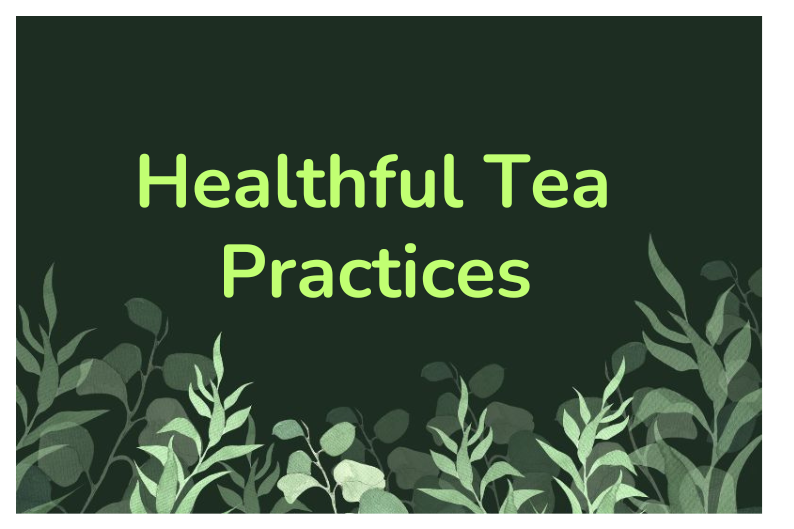
A Comprehensive Guide to Herbal Infusions and Healthy Teas
Herbal Infusions, Steeping Herbs, Tea Benefits: A Guide to Healthful Tea Practices
Herbal infusions have become a popular way for people to enjoy nature’s remedies every day. By steeping herbs in water, anyone can release the flavors and helpful compounds that plants hold. Learning to steep herbs properly helps unlock the most benefits from each cup of tea, supporting overall wellness with ingredients straight from the earth.
Following simple natural health ideas, like those promoted by experts such as Gary Brecka and Barbara O’Neil, more people are discovering the gentle support that herbal infusions can offer. MC Herbs, a trusted natural supplement company, makes it even easier to explore these benefits by offering high-quality herbs for infusions. Their products are perfect for anyone wanting a more natural approach to supporting daily health.
Key Takeaways
- Herbal infusions gently bring out the healthful properties of herbs.
- Steeping herbs the right way can maximize the tea’s benefits.
- MC Herbs offers premium herbs and supplements to support natural wellness.
Mastering Herbal Infusions and Effective Steeping
Herbal infusions can support daily wellness, offering natural flavors and health-boosting properties. Choosing the right infusion method and good quality herbs is key for a flavorful and effective cup.
Types of Herbal Infusions
There are many ways to prepare herbal tea. The most common methods are hot infusions and cold infusions. Hot infusions involve pouring boiling water over herbs and letting them steep uncovered for 5–15 minutes. This method is ideal for soft plants like chamomile or peppermint.
Cold infusions use room temperature or cool water and require several hours of steeping. This is suited for delicate flowers or when a lighter taste is preferred. Some people use a teapot, while others use simple jars or cups. Herbal infusions work for both loose herbs and tea bags.
If they want a stronger taste or more potent benefits, they can steep the herbs longer or add more herb material. MC Herbs herbal blends bring together both flavor and wellness in every cup.
Choosing Fresh and Dried Herbs
Herbs can be fresh or dried. Fresh herbs like mint or lemon balm often give a bright, lively flavor but need to be used quickly so they do not lose their benefits. Dried herbs last longer. They also tend to be more concentrated, so less is needed for a strong infusion.
Loose herbs are often higher in quality than standard tea bags. People can control how much they use and what goes into their beverage. Experts like Gary Brecka recommend choosing organic, natural herbs whenever possible. This helps avoid unwanted chemicals that might be found in some commercial teas.
MC Herbs offers a variety of high-quality herbal supplements and loose herb blends. The company pays special attention to freshness so users get the most benefits.
Essential Equipment and Water Quality
Making a good herbal infusion does not require fancy tools. Common equipment includes a teapot, French press, infuser basket, or even a simple cup covered with a small plate. A fine mesh strainer works well to remove herb pieces after steeping.
Water quality matters a lot. Clean, filtered water gives a clearer taste and helps draw out more of the herbs’ properties. Many natural living advocates like Barbara O’Neil suggest using spring water or purified water rather than tap water.
A good practice is to avoid using boiling water with delicate herbs. Pour water just off the boil over the herbs, especially when working with green or floral teas. MC Herbs includes simple brewing instructions with each supplement blend for the best experience.
Steeping Herbs for Optimal Tea Benefits
Using the right steeping techniques brings out the best flavors, phytochemicals, and health benefits from herbs. Small changes in timing, temperature, or method can significantly impact the potency and enjoyment of herbal teas.
Steeping Time and Water Temperature
Proper steeping time and water temperature help get the most nutrients and flavors from herbs. Tough herbs like ginger root and rooibos need boiling water, while delicate herbs like chamomile or green tea do better at lower temperatures. Overheating can make herbs bitter or ruin sensitive vitamins.
A quick reference table helps:
| Herb Type | Water Temp | Steep Time |
|---|---|---|
| Delicate leaves | 70–85°C (160–185°F) | 3–5 min |
| Dried flowers | 85–95°C (185–203°F) | 5–7 min |
| Hard roots/barks | 100°C (boiling) | 10–20 min |
MC Herbs herbal blends come with suggested temperatures and steeping times, making it simpler to get consistent results. Proper water quality matters too; filtered water is best for clean taste and maximum extraction. Keeping these details in mind supports stronger flavors and better nutrient release, similar to methods explained at Holistic Beet.
Comparing Hot, Cold, and Sun Tea Methods
There are several ways to steep herbs: hot infusion, cold infusion, and sun tea. Hot infusions extract benefits quickly, especially for roots, barks, or dense plant material. Cold infusions and cold brew herbal teas are gentler, often pulling out lighter phytochemicals and preserving heat-sensitive compounds like vitamin C.
Sun tea uses solar warmth instead of boiling water. It can produce unique flavors and lower bitterness but may not extract as many antioxidants as hot water. Some natural health experts, like Gary Brecka, recommend cold infusions to keep antioxidants stable for longer.
MC Herbs recommends trying all three methods to see what works best for each blend. More on cold brewing can be found at UnBottle Your Tea for those who want to maximize flavor and capture sensitive nutrients.
Decoctions for Roots, Barks, and Seeds
Roots, barks, and seeds contain potent phytochemicals and valuable minerals. These tough materials don’t yield their best benefits with a quick steep. Decoctions involve simmering the herbs gently in water for a longer time—usually 10 to 30 minutes—to fully extract their antioxidants and nutrients.
This method is essential for herbs like licorice root, cinnamon, ginger, or dandelion root. MC Herbs decoction-friendly blends offer clear instructions for home use, helping anyone create nutrient-rich teas.
Decoctions can be made in small pots or even slow cookers. Gently simmer, rather than boiling hard, to avoid destroying heat-sensitive vitamins but still break down thick botanical tissues.
Maximizing Nutrient and Antioxidant Extraction
Getting the full benefits from herbal teas depends on technique. Steep leaves and flowers gently to protect delicate antioxidants and vitamin C. Use longer steeping for roots and seeds to maximize extraction of minerals and phytochemicals. The right combo of time and temperature protects nutrients.
Vitamin C, especially, breaks down at high heat. Cold infusions preserve this antioxidant, while hot water draws out tannins and other compounds. MC Herbs blends are designed to balance both, making it easier to get the full range of nutrients.
Stirring or agitating the tea bag or loose herbs halfway through can also help. Using glass or non-reactive teapots preserves the purity of antioxidants, a tip often endorsed by natural wellness guides like Barbara O’Neil and reflected in advice at Reality Pathing.
Frequently Asked Questions
Steeping herbs for the right duration and at the best temperature helps unlock their full flavor and nutritional value. Herbal teas support energy, digestion, and relaxation, making them a popular choice for daily wellness routines.
What is the optimal duration for steeping various types of herbal infusions?
Steeping times vary depending on the herb. Most herbal teas should steep for 15 to 20 minutes to draw out their main plant compounds and flavors. For vitamin- and mineral-rich blends, a longer steep—four to eight hours or overnight—pulls out more nutrients from the plants. These strong infusions are great for those seeking extra nourishment, like nourishing herbal infusions.
Healers like Gary Brecka often encourage letting herbs steep longer to fully benefit from all the plant has to offer. MC Herbs recommends experimenting with steeping times to find a balance of taste and potency.
How do the health benefits of herbal teas compare to those of traditional teas?
Herbal teas are often caffeine-free and are made from a wide range of leaves, flowers, bark, or roots. This makes them ideal for sensitive individuals or elders looking to avoid stimulants and instead focus on gentle support for things like stress, sleep, or digestion—benefits not always found in traditional caffeinated teas. For example, herbal teas for seniors provide support without overstimulation.
MC Herbs’ blends use carefully chosen botanicals to support health in a way similar to the principles taught by Barbara O’Neil, emphasizing natural, gentle wellness.
Can you explain the process of selecting the right temperature for steeping different herbal blends?
Most herbal teas steep best in water just under boiling, around 200°F or 93°C. Delicate flowers, like chamomile or linden, do well with slightly cooler water, while roots and barks need hotter temperatures to release their properties.
Using water that matches the blend helps unlock the plant’s flavor and nutrients. Cold infusions also work for certain botanicals and may help preserve antioxidants, as seen with cold infusions for health-focused teas.
MC Herbs labels provide suggested temperatures for different blends to help users get the best steep every time.
What are the best practices for storing herbal infusions to maintain their quality?
To keep herbal infusions fresh, store them in a clean glass jar in the refrigerator. Use the infusion within 24 to 48 hours to make sure it doesn’t spoil or lose potency. Avoid sunlight and heat, which can break down active plant compounds.
Herbs themselves should be kept dry, cool, and in airtight containers. MC Herbs packages herbal teas with freshness in mind to make it easy for users to enjoy a potent cup every time.
How frequently can one consume different herbal teas for maximum health benefits?
Frequency depends on the type of tea and the body’s unique needs. Most people enjoy herbal teas one to three times a day. A mineral-rich infusion might be used daily, while a stronger detoxifying blend could be brewed just a few times a week.
Listening to your body, as suggested by Barbara O’Neil, can help determine the best schedule. MC Herbs offers guidance on appropriate use with each herbal blend.
What are some common mistakes to avoid when preparing herbal infusions?
Using too much or too little herb, steeping for too short a time, or using water that is too hot or cool can all affect the final result. Not covering the tea while steeping is another mistake, as it lets essential oils escape.
Forgetting to strain the infusion promptly can lead to bitterness or cloudiness. MC Herbs encourages users to follow simple steps, enjoy the process, and learn what works best for their chosen blends.
